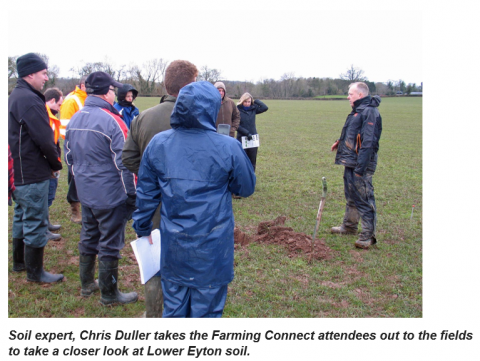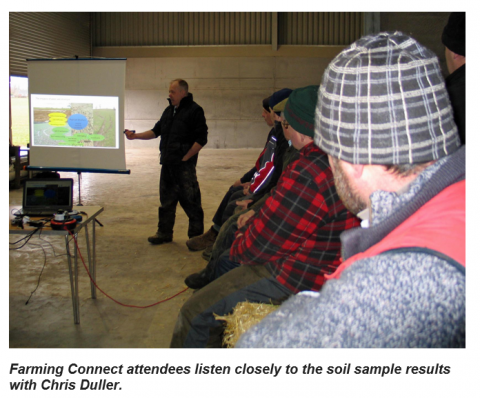27 February 2018
Expert advice to improve soil efficiency will pave the way for better productivity and profitability on a mixed livestock farm near Wrexham.
Wil Evans and his young family of Lower Eyton, Bangor on Dee who farms in partnership with his parents Mr and Mrs John Evans says he has benefitted from a Farming Connect project looking at soil efficiency, organic manure application and targeted fertiliser spreading.
The mixed livestock and arable rented farm which extends to approximately 500 acres recently held an open day event to share findings and expert advice from two well-known figures within the industry.
Chris Duller Grassland adviser for Agriplan Cymru worked with Gareth Foulkes from the Welsh Dee Trust in partnership with United Utilities to offer an insight not only into improving soil productivity, but also the benefits of ensuring land is in good condition enhancing the environmental benefits to brooks, streams and rivers.
“When we see good soil structure it means the land is more resilient to floods and drought, more grass is grown, less weeds appear in the vegetation and animal and crop productivity rises. That’s always good news for farmers,” explains Gareth Foulkes whose work in the central part of the Dee covers areas of grassland and crop production.
“Farming, grassland, crops and water courses go hand in hand in this area, so we’re always keen to work on joint events to highlight how we can benefit one another. Farmers have been custodians of our countryside for generations, and some of the modern ways of dealing with weeds and pests may have been harmful to the environment in the past.
“By understanding and gaining more knowledge in our soil quality, farmers are able to better manage pests such as slugs and weeds such as rush, docks and nettles in crops in a way that is more environmentally aware. This then helps reduce the problem of pesticides and run off containing sediment and nutrients entering the water system. Healthy soils are more productive for the farmer, holding onto nutrients and pesticides better. This means water companies don’t have to spend as much on water treatment, keeping costs down to their consumers,” explains Gareth.
Lower Eyton grows winter wheat, winter barley, spring barley and forage maize during the year. The free draining soil sees some heavier clay by the Bangor on Dee racecourse and silt and sand in other parts nearer the water’s edge. 300 beef cattle are finished on the farm selling at approximately 28 months at Oswestry Market and there is a 5,000 free range poultry layer enterprise selling to a niche brand and sold through Waitrose.
During the open day event at Lower Eyton, 30 farmers and guests were given a hands on approach of scrutinising soil in a number of fields at the Evans’ family farm.
Chris Duller, grassland adviser explains: “When we’ve sampled soil and looked at the phosphate, potash and pH levels, we can then put an in-depth plan together for individual fields’ needs. This will mean that home-produced manures and purchased nutrients can be targeted to specific areas which brings benefits to the profitability of the farm.”
“Here at Lower Eyton, Wil and the family have been soil sampling for a number of years, but even on a progressive mixed arable and grassland farm such as this one, there is always room for improvement. Soil chemistry is only part of the story – we need to make sure that structure and soil biology is also in good condition” explains Chris Duller.
Out in the fields at Lower Eyton, the grassland adviser explained that actually handling your own soil brings a number of benefits to decisions made regarding planting, grazing and harvesting. When digging a square foot of turf, the number of worms found in the fields’ soil creating drainage channels was a joy to see, said Chris.
“You could see how healthy the soil is by the variety of worms we found, we could see good soil structure
and efficient rooting depths. Even in a field of grazed roots in mid-winter where you may expect to see some compaction in the soil, we saw healthy structure and quality.
“Overall the soil here is healthy, and with our in-depth analysis, Wil will be able to enhance the soil efficiency in some of the areas that needed more attention. He is keen to look at precision farming, and this project has given him a better insight into progressing,” explains Chris.
Recommendations to the farm enterprise include moving away from routine purchasing of fertilisers, to purchasing based on the soil status and the individual requirements of the sown crop. This will ensure that the business is getting the maximum return for the investment made. The value of the manure produced on the farm was estimated at £1,019 for the poultry manure and £4,580 for the cattle manure. It is therefore essential to ensure that this nutrient organic matter is utilised in the most effective and efficient way on the farm land.
Chris Duller concluded: “A key message to all farmers is that healthy soil will provide resistance and resilience to a changing climate. Make soil management a priority. Soil test, get some slurry analysis sorted, ensure the right amount of nutrient is going to the right place at the right time and you’ll be on the right track.”
This work at Lower Eyton has received funding via Farming Connect through the Welsh Government Rural Communities - Rural Development Programme 2014-2020, which is funded by the European Agricultural Fund for Rural Development and the Welsh Government.


